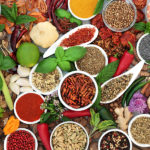By David Blyweiss, M.D., Advanced Natural Wellness
December 28, 2020
I read an article the other day that surprised me. It said a record high 23% of twenty-something men aren’t have sex regularly.[1]
“Are you kidding me? Why in the world not?”
I know many older men who would love to be having sex like they did in their youth. But their bodies just aren’t cooperating.
These older fellows come into my office begging me for help with their performance. And they’re not alone…
The National Institute of Health has reported that thirty million men in the U.S. struggle with the inability to perform.[2]
Often, they’re looking for some little blue pill to fix the problem.
While this might seem like an obvious “fix,” I always caution them to take a step back and think. Their issues in the bedroom may be a sign of a much larger problem… their heart.[3]
Open your arteries, improve blood flow for a new health miracle...
Did you know your circulatory system has over 60,000 miles of arteries, veins and other blood vessels, if stretched end to end?
But as you age, your blood vessels undergo changes, which may cause them to stiffen, thicken and get clogged.
GOOD NEWS! Doctors have now identified a “Miracle Molecule” inside your arteries that helps OPEN your arteries and IMPROVE blood flow.
It’s what Dr. Valentin Fuster calls it, "One of the most important discoveries in the history of cardiovascular medicine."To you, that means...
- Healthy blood pressure
- Sharper mind and memory
- Skyrocketing energy and muscular strength
- Increased pleasure and passion in the bedroom
- Improved circulation to every cell and organ in your body
Go here to discover a new natural way to significantly boost the levels of this miracle molecule in YOUR body NOW!
Researchers have long known that erectile dysfunction (ED) and heart disease have overlapping risk factors. It makes sense if you think about it…
The blood vessels in the penis are narrower in diameter than in other parts of the body. So, if your arteries are beginning to clog due to vascular disease, the penis is one of the first places you’ll notice a problem. [4]
It’s Like a Canary in the Coal Mine
High blood pressure and build-up of plaque on the blood vessels causes damage to the delicate lining in the arteries. This prevents blood from flowing freely into the organ to start and maintain an erection.
One study looked at men who had moderate to severe ED. These fellows were at a 65% increased risk of having coronary heart disease within 10 years. They were also at a 43% higher risk of having a stroke within the same period of time.[5]
Doctors who understand this connection can help their ED patients make lifestyle changes or seek early treatment to prevent a catastrophic event like a heart attack or stroke.
If you haven’t yet experienced any problems with erectile dysfunction, then you probably want to do everything in your power to keep it that way…
The Rancho Bernardo Study found that men who had the classic heart disease risk factors were more likely to experience ED in the next 25 years. These risk factors include smoking, hypertension, diabetes, high cholesterol, high blood levels of triglycerides, and obesity.[6]
You can cut down on your risk of developing bedroom performance problems by first addressing these issues. Choose healthy foods with a variety of rainbow colored vegetables, limit your meat intake, and be sure to get in plenty of movement every day and stop smoking.
Are You Suffering From...
- Love handles and a pot belly
- Romance that isn't what it used to
- Forgetfulness and inattention
- Low (or no) strength and endurance
- A sex drive that's shifted into neutral...or worse
If so...you may have Mature Male Burnout. Click here to discover more about this unique condition and what you can do about it.
Natural Ways to Improve Blood Flow Where it Counts
The other important consideration has to do with the health of your blood vessels…
Your body naturally produces nitric oxide – which works to relax the arteries and reduce blood pressure so blood can flow freely throughout the body. It also decreases the small dense LDL cholesterol particles that like to sneak through the inner lining of your coronary arteries causing build up.
Age also plays a role in your ability to make NO. By the time you reach age 40, your body is only making about half as much NO as it did in your youth. You can combat this change by adding more exercise to your routine. [7]
Foods and drinks with anthocyanins are another great trick to get the blood to flow faster. They help reduce inflammation and promote the release of NO.[8]
Try eating more strawberries, blueberries, cherries, and even red wine to get your daily anthocyanins. These foods are also rich in antioxidants and can cut your chances of getting ED by 14%.
Vegetables rich in nitrates can also help your body produce more nitric oxide. That’s why I really like leafy greens like arugula, spinach, and kale. Nitrate rich foods also include celery, lettuce, Chinese cabbage, radish, and turnips.[9]
My absolute favorite nitrate rich food is red beetroot (or beetroot juice.) I like to drink it mixed with apple juice, lemon juice, and a bit of ginger to give it a zing!
If you want a more concentrated dose of nitrates, try a beetroot juice supplement.[10] Look for one that contains a blend of beetroot juice and arginine (another NO enhancer.) I suggest you start with 50 mgs a day to help relax your vessels and arteries.
You should also consider adding more garlic to your regular diet. Garlic can help reduce the plaque lining your arterial walls and improve circulation. Just two cloves a day are enough to make a difference.
If garlic breath isn’t to your liking, then try a 1200 mg aged garlic extract divided into two 600 mg doses.
Sexual wellness is in your power – you just need to make smart decisions now so you stay well for the future.
Sources:
[1] https://www.sciencealert.com/the-percentage-of-americans-not-having-sex-has-reached-a-record-high
[2] NIH Consensus Conference: “Impotence. NIH Consensus Development Panel on Impotence” . JAMA1993; 270: 83.
[3] Banks E, et al. Erectile dysfunction severity as a risk marker for cardiovascular disease hospitalisation and all-cause mortality: a prospective cohort study. PLoS Med. 2013;10(1):e1001372.
[4] Kirby, M., G. Jackson, and U. Simonsen. “Endothelial dysfunction links erectile dysfunction to heart disease.” International journal of clinical practice 59.2 (2005): 225-229.
[5] Ponholzer, Anton, et al. “Is erectile dysfunction an indicator for increased risk of coronary heart disease and stroke?.” European urology 48.3 (2005): 512-518.
[6] Fung, Maple M., Richele Bettencourt, and Elizabeth Barrett-Connor. “Heart disease risk factors predict erectile dysfunction 25 years later: the Rancho Bernardo Study.” Journal of the American College of Cardiology 43.8 (2004): 1405-1411.
[7] Maeda, Seiji, et al. “Moderate regular exercise increases basal production of nitric oxide in elderly women.” Hypertension Research 27.12 (2004): 947-953.
[8] Wallace TC. Anthocyanins in Cardiovascular Disease. Adv Nutr. 2011 Jan; 2(1): 1–7.
[9] Hord NG, et al. Food sources of nitrates and nitrites: the physiologic context for potential health benefits. Am J Clin Nutr. 2009 Jul; vol. 90 no. 1 1-10.
[10] Kapil V, et al. Dietary nitrate provides sustained blood pressure lowering in hypertensive patients: a randomized, phase 2, double-blind, placebo-controlled study. Hypertension. 2015 Feb;65(2):320-7.







